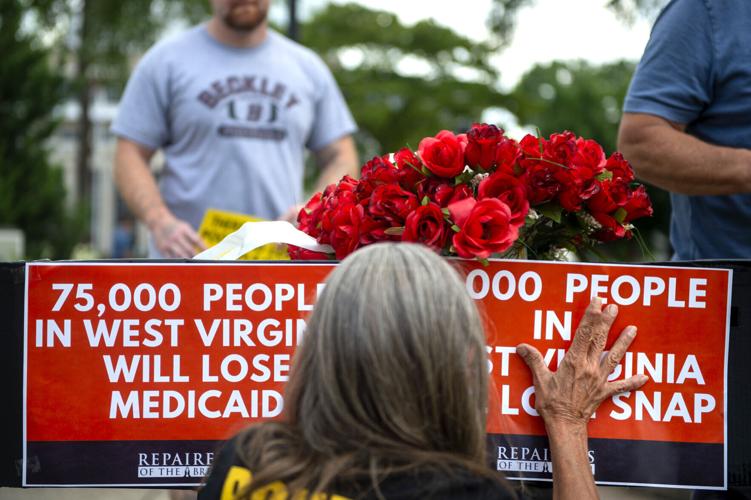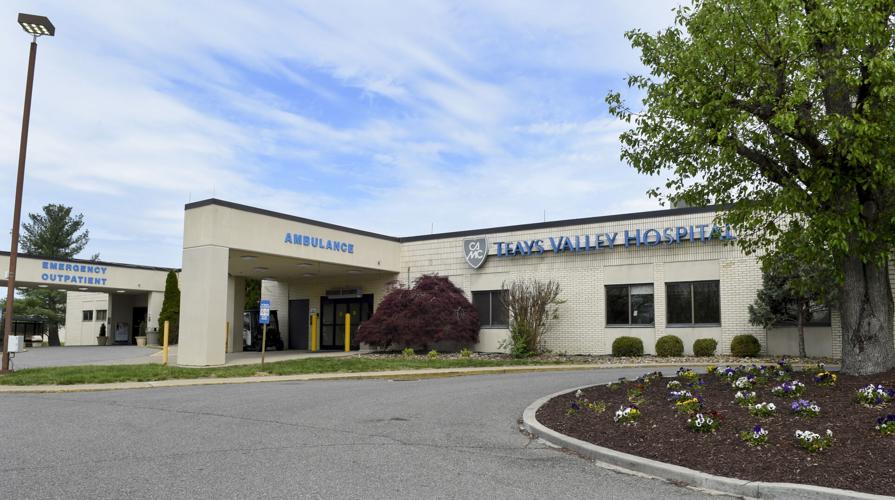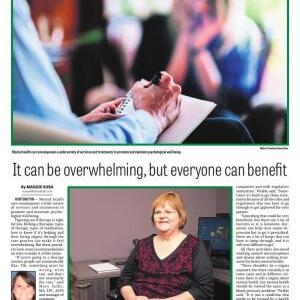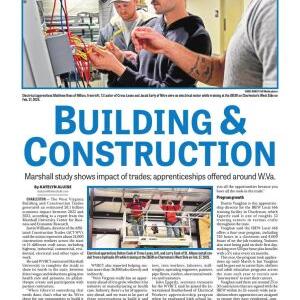Fewer obstetricians to help bring West Virginians into the world.
Fewer doctors and nurses to keep them from leaving it.
Fewer equipment upgrades and renovations at hospitals.
Fewer hospitals.
And more crowded emergency rooms at the hospitals that remain ����ֱ��� spreading pain and suffering across West Virginians of all ages whether they have Medicaid or not.
That����ֱ���s what President and CEO Jim Kaufman says is on the state����ֱ���s table as a result of the One Big Beautiful Bill Act, far-reaching budget reconciliation legislation signed into law by President Donald Trump this month with approval from West Virginia����ֱ���s congressional delegation.
����ֱ���I do think over the long term, over the next couple of years, as the provisions of the Big Beautiful Bill Act go into effect,����ֱ��� Kaufman said, ����ֱ���hospital leadership teams will be making very, very difficult decisions.����ֱ���
Those decisions are in store, hospital and other health care advocates say, because of sweeping cuts the budget reconciliation law makes to Medicaid, the joint federal and state program that helps cover medical costs for over 500,000 West Virginians ����ֱ��� roughly 30% of the state population.
Designed to extend tax cuts enacted under Trump in 2017 that have benefited the wealthy, the law will result in about 17 million more people without health insurance nationwide, according to a projection by KFF, a nonpartisan health policy research group formerly known as the Kaiser Family Foundation.
The budget reconciliation legislation will increase West Virginia����ֱ���s uninsured rate by 70%, according to an analysis from Families USA, a nonpartisan health care consumer advocacy organization.
Health care experts expect the law to sever critical Medicaid revenue for hospitals while raising costs of uncompensated care, doing so by:
- Conditioning Medicaid eligibility for most individuals ages 19 to 64 on working at least 80 hours per month
- Generally prohibiting states from setting new health care-related taxes known as provider taxes or from increasing rates of existing taxes
- Narrowing state-directed payments from managed care organizations to their providers by capping payment rates for inpatient hospital and nursing facility services
The upshot will be a downturn in health care for West Virginians of all income levels, Kaufman and other hospital advocates say.
According to discharge data from the WVHA, Medicaid covered these services in West Virginia in 2024:
- 65% of substance use disorder inpatient stays
- 54% of mental health inpatient stays
- 48% of births
- 34% of emergency department visits
����ֱ���We recruit providers, doctors, nurses, respiratory therapists. They care for a community,����ֱ��� Kaufman said. ����ֱ���It����ֱ���s not just going to impact Medicaid beneficiaries. It will impact everyone in that community.����ֱ���
To what extent and when is still to be determined.
Kaufman, though, said hospital leadership teams will look at what services they offer and consider equipment and renovation delays.
In the meantime, hospital advocates plan to lobby Congress to concerning provisions of the law that don����ֱ���t take effect for years, including provider tax phasedowns that begin in fiscal year 2028 for states like West Virginia that have adopted Medicaid expansion and grandfathered state-directed payment reductions that begin in 2028.
����ֱ���[T]here are dates and rates that can be revisited, but it depends on us to tell the stories about the potential impact that this will have on patients and communities that we serve,����ֱ��� President and CEO Rick Pollack said on his industry group����ֱ���s recorded last week.
����ֱ���If we can����ֱ���t tell those stories in a very compelling way, we����ֱ���re not going to get the attention we need to get people to go back.����ֱ���
Mindy Holcomb is willing to share her story.
Holcomb, a health care organizer with the , a progressive advocacy organization, recalled having to ration insulin as a Type 1 diabetic despite being insured with a full-time job.
����ֱ���I hate to say this,����ֱ��� Holcomb said, ����ֱ���but I����ֱ���ve already started stockpiling again because of fear.����ֱ���
Holcomb announced she����ֱ���s planning a tour with the West Virginia Center on Budget and Policy, a progressive policy analysis group, of the seven areas served by hospitals listed as being at risk of closure due to the budget reconciliation law in a widely cited .
����ֱ���We����ֱ���ll also go to any city, even if they don����ֱ���t have a rural hospital, we����ֱ���ll go to them, have an event. We����ֱ���ll canvas in their area,����ֱ��� Holcomb said. ����ֱ���We really wanted to take this as far and as wide as possible, so that people are informed of what����ֱ���s going to happen.����ֱ���
Negative net incomes common among flagged hospitals
The University of North Carolina study indicates seven West Virginia hospital organizations at risk of closure, based on Centers for Medicare and Medicaid Services health care cost reporting:
- Broaddus Hospital Association in Barbour County
- Grafton City Hospital in Taylor County
- Jackson General Hospital in Jackson County
- Logan Regional Medical Center in Logan County
- Minnie Hamilton Health Care Center in Calhoun County
- Montgomery General Hospital in Fayette County
- Welch Community Hospital in McDowell County
Some of those hospitals have reported negative net incomes in tax returns submitted for recent years.
Montgomery General Hospital, Inc. reported losing over $4.1 million on balance in fiscal year 2023, with expenses of roughly $36.4 million exceeding revenue of under $32.2 million.
Grafton City Hospital, Inc., a Mon Health affiliate, reported losing $800,539 on balance in fiscal year 2024, with expenses of about $17 million exceeding its $16.2 million revenue.
Broaddus Hospital Association, Inc., which is in the Vandalia Health fold, reported losing $641,105 on balance in fiscal year 2023, with expenses of just under $22.8 million exceeding its revenue of roughly $22.1 million.
Minnie Hamilton Health Care Center reported a positive net income of $612,041 in fiscal year 2023, with revenue of approximately $31.2 million slightly exceeding expenses of roughly $30.6 million.
Jackson General Hospital, a West Virginia University Medicine affiliate, reported fiscal year 2023 net income of roughly $5.8 million, with expenses of more than $47.7 million exceeded by revenue of about $53.6 million.
Hospitals reported providing a wide array of services in their tax returns.
Minnie Hamilton Health Care Center reported that services in 2023 there included 25,713 outpatient visits and 3,745 emergency room visits. It reported community services that included social service case management, insurance eligibility assistance workers, health care worker recruitment, monetary support to local public schools and an oral health promotion project.
Montgomery General Hospital reported 640 acute inpatient days, 22,076 outpatient visits, 7,674 emergency room visits, 1,018 ambulatory surgery procedures and 22,576 physician office visits, with charges bypassed for charity care totaling $20,218.
Jackson General Hospital said it had 12,512 emergency room visits, 1,941 inpatient days and 2,371 surgery cases in 2023.
Broaddus Hospital Association identified in its tax return as a 60-bed, long-term and intermediate care facility with ����ֱ���considerable focus on rehab services����ֱ��� and radiology services that include CT scans, MRIs and mammography.
Kaufman said the average hospital in West Virginia has about a 1% operating margin ����ֱ��� the profit it makes on a dollar of sales after deducting production costs but before factoring in taxes or interest.
����ֱ���We do struggle,����ֱ��� Kaufman said, ����ֱ���because the payments that hospitals are receiving, especially from governmental programs, are not keeping pace with the increasing costs, and that����ֱ���s actually forcing them to reevaluate services, capital investments, efforts to ensure access to care in their local community.����ֱ���
Which hospitals could struggle most under new law?
The West Virginia Hospital Association consists of 72 member hospitals that fall into three categories, Kaufman said:
- Larger, acute care hospitals like Charleston Area Medical Center����ֱ���s complex of hospitals and WVU Medicine����ֱ���s J.W. Ruby Memorial Hospital
- Critical access hospitals, federally designated as such if located either more than 35 miles from the nearest hospital or more than 15 miles in areas with mountainous terrain or only secondary roads
- Specialty hospitals, which may include children����ֱ���s hospitals, mental health facilities and long-term post-acute care
The larger acute care facilities and critical access hospitals will be impacted the most by the budget reconciliation law, Kaufman said.
Hospital leaders declined to identify what services could be on the chopping block if the law remains as is.
President and CEO Scott Raynes said the budget reconciliation law ����ֱ���includes significant changes to the healthcare landscape ����ֱ��� most notably, provisions related to Medicaid and the provider tax.����ֱ���
����ֱ���We are actively reviewing the bill����ֱ���s language and are in close communication with the West Virginia Hospital Association to ensure we accurately understand the short- and long-term impacts these changes may have on MHN and hospitals across the state,����ֱ��� Raynes said in an emailed statement.
Raynes said the network ����ֱ���will be seeking innovative solutions and looking to our peers across the country to determine the best approaches to navigate this new norm.����ֱ���
Jackson General Hospital President and CEO Candace Miller said in an emailed statement that ����ֱ���the hospital����ֱ���s connection to the broader WVU Medicine network provides us with stability, resources, and a shared commitment to improving the health of West Virginians.����ֱ���
����ֱ���Until we know the full plan and the potential effects on health care delivery, it is premature to make any potential changes to our services,����ֱ��� Vandalia Health spokesperson Dale Witte said in an email.
But Kaufman offered a chilling bottom-line projection: More than $1 billion will be stripped from West Virginia hospitals by the new law.
����ֱ���[Y]ou����ֱ���re not overreacting,����ֱ��� activist Sally Roberts, who helped carry a cardboard casket to the office of Sen. Shelley Moore Capito, R-W.Va., Monday to protest the budget reconciliation law, said during the Citizen Action Group committee meeting two days later. ����ֱ���It����ֱ���s real. This is real.����ֱ���
How $50 billion fund for rural health could fall short
Capito and other supporters of the law have touted its creation of a $50 billion relief fund for ����ֱ���rural health transformation.����ֱ���
But that $50 billion is only one-third of the estimated loss of federal Medicaid funding in rural areas, according to a published Wednesday of financial impact estimates from the independent, nonpartisan Congressional Budget Office.
The $50 billion is to be allotted in grants to states between fiscal years 2026 and 2030, but that distribution will happen before many of the health care funding reductions in the law hit.
Nearly two-thirds of reductions in federal Medicaid spending occur after fiscal year 2030, KFF����ֱ���s analysis of CBO estimates determined.
The $50 billion program has been framed by Capito and others as for rural hospitals, but the law doesn����ֱ���t require that the funding go to hospitals ����ֱ��� discretion that KFF President and CEO Drew Altman, predicted in an Friday would result in diluted benefit to rural hospitals as state health departments and other state agencies, counties, and community organizations compete for support.
����ֱ���It����ֱ���s more of a little thank you to the administrators before they have to shut it down,����ֱ��� Holcomb said.
����ֱ���It����ֱ���s going to mean life and death����ֱ���
Kaufman says there����ֱ���s time for hospitals to figure out what they can they do.
����ֱ���Also,����ֱ��� Kaufman said, ����ֱ���it gives us time to point out potential impacts on rural communities.����ֱ���
Holcomb plans to use her time to do just that. She says she����ֱ���ll hit the road to start the advocacy tour in Philippi, home of Broaddus Hospital Association, in September.
����ֱ���We����ֱ���ve got so many people in such rural areas that if some of these rural hospitals close, it����ֱ���s terrifying,����ֱ��� Holcomb said. ����ֱ���It����ֱ���s going to mean life and death for people.����ֱ���














